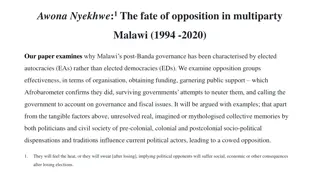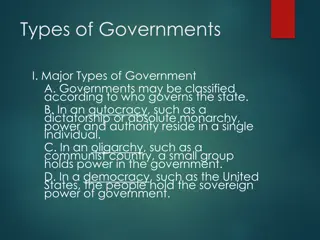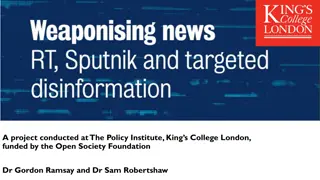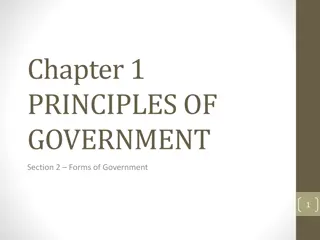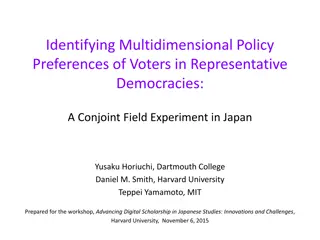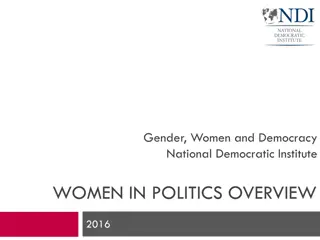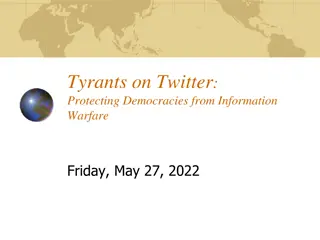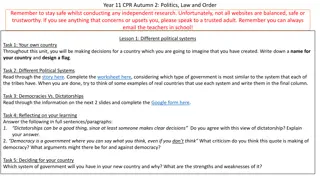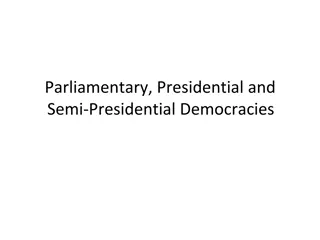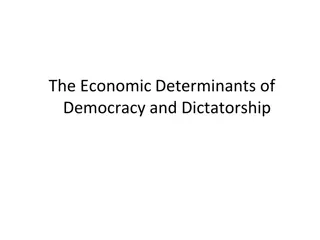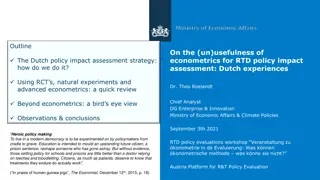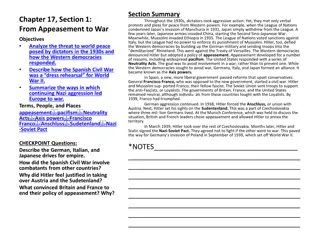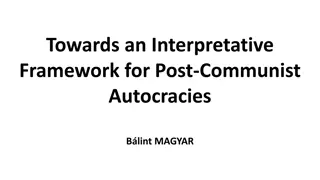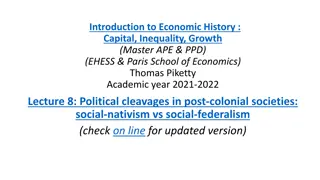Think Tanks: Insights and Impact on Global Policy
Delve into the world of think tanks, exploring their origins and evolution globally and nationally. Discover their significance as drivers of policy debates and decision-making processes. Uncover how think tanks serve as bridges between knowledge and power in modern democracies, shaping public polic
0 views • 23 slides
Democracy in the EU and Upcoming European Elections Overview
Explore key findings on the state of democracy in the EU, upcoming European elections, and global trends. Europe remains a high-performing region, with Central Europe showing notable democratic growth. Discover how the EU acts as a countervailing institution and challenges faced by strong democracie
0 views • 15 slides
The Fate of Opposition in Multiparty Malawi: 1994-2020
This paper explores why Malawi's governance post-Banda has been dominated by elected autocracies rather than democracies. It delves into the effectiveness of opposition groups in terms of organization, funding, public support, and resilience against government attempts to suppress them. The influenc
0 views • 6 slides
Understanding Types of Governments and Democracies
Explore the major types of governments including autocracy, oligarchy, and democracy. Learn about direct and indirect democracies, as well as the characteristics and soil that nurture democracy. Discover how government functions in various societal structures and the importance of citizen participat
0 views • 4 slides
Analysis of Weaponising News: RT, Sputnik, and Targeted Disinformation
A project conducted at The Policy Institute, King's College London, funded by the Open Society Foundation, delved into the extensive English-language output of RT and Sputnik. By examining the impact on news coverage in the UK, the project found consistent framing of European democracies as dysfunct
0 views • 18 slides
Liberal Democracy and Citizenship: Rights, Duties, and Participation
Citizenship in liberal democracies entails equal rights, duties, liberties, and constraints, with a focus on civil and political rights. The entrenchment of these rights has been key in establishing popular sovereignty and individual autonomy. Civil rights, developed in the 18th century, centered on
2 views • 16 slides
Understanding Forms of Government Today
Different forms of government exist in the world today, classified based on characteristics like participation, power distribution, and branches of power. Democracies emphasize people's involvement, while dictatorships concentrate power. Governments can be unitary, federal, or confederate, and power
5 views • 17 slides
Understanding Citizenship and Immigration in Modern Democracies
Citizenship, a fundamental institution of modern democracies, defines the relationship between individuals and the state through reciprocal rights and duties. However, citizenship has a dual nature, serving to both include certain individuals as citizens and exclude others. Immigrants residing withi
0 views • 21 slides
Understanding Voter Policy Preferences in Representative Democracies
A study explores identifying multidimensional policy preferences of voters in representative democracies, focusing on the challenges of standard tools and common survey questions. The research aims to uncover how voters prioritize policy issues and which policies they prefer, beyond traditional surv
0 views • 20 slides
Perspectives on Modernization, Development, and Democracy
Various perspectives on the relationship between modernization, development, and democracy are explored, including the linear view of democracy as a modernization endpoint, the trade-off between development and democracy, and the case for democracy despite authoritarian advantages. The debate betwee
0 views • 16 slides
Women in Politics: Empowering Change through Participation
Women's political participation is essential for vibrant democracies. Despite progress, significant challenges remain in achieving gender equality in political spheres worldwide. This overview highlights the importance of women's involvement in decision-making processes, the need for supportive lega
0 views • 32 slides
Understanding Public Services in Modern Democracies
Public services play a crucial role in modern democracies, encompassing a wide range of essential services provided by the government to its citizens. These services, whether directly provided or publicly financed, are integral to ensuring equal access and upholding fundamental human rights. Public
0 views • 10 slides
Tyrants on Twitter: Safeguarding Democracies from Information Warfare
Exploring the central argument of the new Cold War with China, focusing on military, economic, and information competition. The discussion addresses the threat posed by Chinese and Russian information warfare to Western democracies, emphasizing the need for regulatory harmonization among leading Wes
0 views • 17 slides
Understanding Political Regimes: From Oligarchy to Mafia State in Hungary
Exploring the evolution of political systems in Hungary post-1989, this examination delves into a spectrum of regimes including liberal democracies, dictatorships, and hybrid structures. It analyzes the intricacies of patronage politics and the sociological dimensions that shape the landscape of pow
0 views • 28 slides
Understanding Political Systems and Types of Voting
Explore different political systems, democracies vs. dictatorships, and types of voting processes in this engaging lesson plan. Students will learn to make informed decisions for their imaginary country as they delve into the intricacies of governance and electoral systems. From designing flags to a
0 views • 16 slides
Understanding Different Types of Democracies
Democracies can be classified into parliamentary, presidential, and semi-presidential systems based on their form of government. Each type has distinct characteristics, such as legislative responsibility and methods for government removal like votes of no confidence. Parliamentary and semi-president
0 views • 96 slides
The Influence of Economic Development on Democratization
Economic development plays a crucial role in the democratization process, as societies transition through different stages of economic growth. Modernization theory suggests that as societies develop economically, rulers are more inclined to seek the consent of the people, leading to the emergence an
0 views • 81 slides
Dutch Experiences with Econometrics in RTD Policy Impact Assessment
Dutch policy impact assessment relies on a mix of RCTs, natural experiments, and advanced econometrics to evaluate the effectiveness of interventions. Dr. Theo Roelandt, Chief Analyst at the Ministry of Economic Affairs & Climate Policies, emphasizes the importance of evidence-based policymaking in
0 views • 16 slides
Dictator Aggression and the Outbreak of World War II in the 1930s
Throughout the 1930s, dictators such as Hitler, Mussolini, and Japanese leaders took aggressive actions that threatened world peace. Western democracies responded with verbal protests and a policy of appeasement, allowing dictators to expand their empires unchecked. The Spanish Civil War served as a
0 views • 4 slides
Framework for Understanding Post-Communist Autocracies
The illusion of linear progress towards liberal democracies post-1989-1990 revolutions is challenged by the complex reality of post-communist autocracies. This framework explores the characteristics of democracy, autocracy, and dictatorship to categorize regimes, highlighting the challenges and nuan
0 views • 41 slides
Political Cleavages in Post-Colonial Societies: Social-Nativism vs. Social-Federalism
This lecture explores the shifting political cleavages in post-colonial societies, focusing on the rise of social-nativism and social-federalism. It examines the reversal of the education cleavage in Western democracies, the emergence of social-nativism in post-communist Eastern Europe, and the chan
0 views • 30 slides


